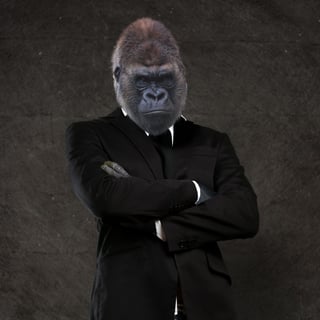Dartboard Investments:
Contests, Monkeys, and a Random Market
"A blindfolded monkey throwing darts at a newspaper’s financial pages could select a portfolio that would do just as well as one carefully selected by experts.” - Burton Malkiel
Can the Stock Market Be Predicted?
 Back in 1973, Princeton Economist Burton Malkiel published the first edition of A Random Walk Down Wall Street, his now-classic examination of the stock market. He was the first to apply the mathematical theory of random walks to Wall Street practices, theorizing that share prices could not be predicted due to their random quality.
Back in 1973, Princeton Economist Burton Malkiel published the first edition of A Random Walk Down Wall Street, his now-classic examination of the stock market. He was the first to apply the mathematical theory of random walks to Wall Street practices, theorizing that share prices could not be predicted due to their random quality.
Malkiel's controversial viewpoint - and his famous statement about the blindfolded monkeys - served to inspire a lot of stock picking investment contests over the years. Started partly out of curiosity and partly as a gimmick to entertain readers, the contests have served to show there is some wisdom behind Malkiel's theory.
The Journal Puts Malkiel to the Test
Starting in 1988, the Wall Street Journal inaugurated their annual Investment Dartboard Contest, pitting experts (and later, WSJ readers) against WSJ staffers lobbing actual darts at a stock table. The experts squeaked by in the initial battle, but over the years, the darts proved themselves a worthy competitor, winning almost (but not quite) as often.
The rules changed over time, but were fundamentally simple. Readers selected a stock from the New York Stock Exchange or Nasdaq market that they believed would do well in the following six months. The WSJ then chose six reader entries to compete against each other and six stocks chosen by tossing darts at stock listings. Experts participating in the contest had a few extra rules, such as minimum market capitalization ($50 million), daily trading volume ($100k), and share price (at least $2).
Today, the Investment Dartboard Contest sponsored by the WSJ has been retired, with the publication citing a desire to devote more resources elsewhere to new features and stories. The darts "trumped the readers" (and beat the experts too) in the final contest in April of 2013, with impressive gains of 17.4%. However, enterprising investment analysts are finding new ways to test Malkiel’s hypothesis.
(Malkiel, while admitting the contests "were fun," maintains that they were not done in such a way as to give efficient market theory a fair test.)
A Secret and Exclusive Cabal of Investors
In a June, 2014 blogpost on WSJ.Money, Brett Arends wrote about a private, secret investment fund that operates out of a quiet office suite in Massachusetts near MIT. There, a small team of analysts with PhDs in Math, Astrophysics and Quantum Mechanics constructed the most sophisticated algorithm in world history for analyzing the market and predicting the price of securities.
In its first decade of existence, the fund more than tripled investments, outpacing all the major stock and bond indexes. This secret fund has beaten all but six of the 1,250 funds that survived the last ten years.
At this point in the post, Brett Arends comes clean. Although the results are genuine, the secret fund is fictional. What Arends really did was get a list of the world’s top 3,000 stocks and then pick some at random. As he states, “This is, in other words, the proverbial portfolio picked by a blindfolded monkey.”
Arends' view is that the S&P 500 and the MSCI World Index are deeply flawed. “They do not weigh their members equally, but rather according to their market values.” This means that a disproportionate weight is placed on the biggest and most expensive stocks and markets, which tend towards slower movements. This helps to explain why U.S stock indexes have trailed random stock funds by about 1.6 percentage points a year.
The Wizard of Winton
David Harding is known as the “Wizard of Winton.” Winton Capital, his hedge fund firm, is the world’s 14th largest, with 297 employees and $25.5 billion in assets under management. They are known for long term investments in oil and gold, and remained profitable during the worldwide financial crash of 2008.
After chafing against criticism for his trading system methodology, Harding decided to go head-to-head with the S&P 500. As Harding said, The S&P 500 is a set of rules for buying and selling stocks. It’s a trading system, and by the way, it’s not a very good one.”
In 2009, Harding chose 50 stocks at random and weighted them equally. “We tested the idea and immediately did better than the S&P 500.” As of late 2014, the randomly-selected equity "system" he devised outperformed the market soundly.
Some Actual Monkeys (Blindfold Optional) and A Cat
Of course, some people have employed real monkeys for their random picks. Back in 1999, a chimpanzee named Raven threw ten darts at a board with 133 internet-related companies. One of her picks was up 95% by the week’s end. Ultimately, her portfolio out-performed more than 6000 money managers by earning a 213% return.
More recently, a Russian circus chimp named Lusha picked a portfolio that bested 94% of Russia’s mutual funds. According to the Daily Mail, she almost tripled her initial capital of 1 million rubles ($35,884).
One of the most famous simian money managers is Adam Monk, a Brazilian cinnamon-ringtail cebus monkey who picked stocks for the Chicago Sun-Times by circling his choices in the newspaper with a red pen. Although he is now retired from stock picking, Adam Monk outperformed the indexes from 2003-2006. Even in 2008, when most money managers lost upwards of 35%, Monk’s portfolio was only down by 14%.
But primates aren’t the only leading lights in random investments. The Observer, a British newspaper, organized a challenge in 2013 between three teams. One was a group of novice finance students, the second was comprised of a wealth manager, a stockbroker and a fund manager, while the third team was…a ginger tabby named Orlando. By the year’s end, the students lost money, the pros gained 3.5%, while Orlando (who would toss his toy mouse on a grid of choices) showed a return of nearly 11%.
There are conceivably other advantages to random selections (or animals as money managers). As Mark Gangloff pointed out in a Huffpost Business column, “The great thing about letting a cat pick your stocks for you is the low fees.” Had they been actual investments, Orlando would have provided an excellent return on kibble and catnip!
Throwing Your Own Darts (or Building a Better Game)
As Burton Malkiel said in 2009, “Sure, there are a few people who have outperformed the index. But you can almost count them on one hand.” The relative success of dartboard investment contests only reinforces the view that Wall Street is Reno in a three-piece suit.
If you are determined to “try your luck” in the stock market we suggest following some specific precautions.
Start with Monopoly money. Use “pretend” money to test the waters and practice trading. This will help familiarize you with the process and give you a clearer idea of what your results might be. When you gain enough confidence, you can graduate to real money, but use modest amounts that you can afford to lose.
Realize it’s a gamble. The money you use is not strictly an investment – it’s a bet. Be aware that no matter what the odds, there are no safe bets. Don't invest money you can't afford to lose in the stock market.
Use a broker or mentor with lots of experience. Find someone with a great track record who has been in the game for decades.
Put stop loss orders in place. To minimize excessive losses, set up a stop loss order. This way, if the stock dips below a certain point or percentage (such as a 20% drop), the account automatically sells the stock. Put a trailing stop order in place so that if the stock shows a dramatic gain, the stop loss order adjusts accordingly.
Diversify outside of the stock market. Unfortunately, we've been trained to think of "diversification" as investing in different types of stocks! But true diversification means that any stocks in your portfolio are balanced with other types of investments and assets, such as:
- real estate (properties and/or bridge loan investments)
- business (your own or someone else's)
- life insurance (cash value savings or life settlement investments)
- intellectual property (licensing, publishing, information products, etc.)
Minimize your reliance on the stock market. Remember that stocks are inherently risky and unpredictable. Wise investors do not rely on the stock market - or random chance -to build wealth.
(Note: No monkeys, cats or stockbrokers were harmed in the researching or writing of this article.)
Sent from the Land of Possibilities!
©Prosperity Economics Movement and The McGriff Alliance






Leave a comment